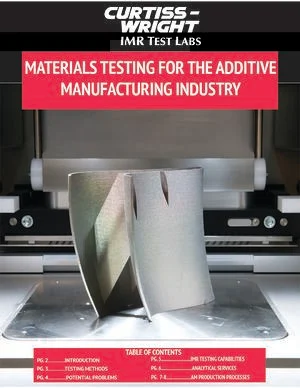Additive Manufacturing Materials Testing
IMR's Additive Manufacturing testing lab has expanded capabilities in testing powdered metal characterization and laser-sintered metal testing & analysis to help manufacturers quickly and accurately evaluate their product throughout the design, development, and production phases.
For example, IMR provides comprehensive powder analysis to characterize the starting powder via the following test methods fully:
- Chemical Analysis (ICP-AES, ICP-MS)
- Percent Crystallinity Testing
- Particle Size Testing (Microtrac)
- Morphology Analysis of Density and Flow (XRD, SEM and optical)
A full list of analytical services offered by IMR for Additive Manufacturing is listed below. Or if you're ready for a quote, click the button below.
ADDITIVE MATERIALS TESTING - POWDERS, RAW MATERIALS
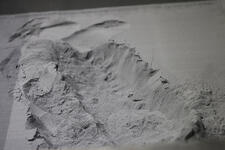
Many additive manufacturing (AM) challenges are being overcome through the use of materials testing and analysis. This starts with the need for well-characterized raw materials:
- Powders
- Pastes
- Wires
SLS powders especially need ongoing testing due to the need to reuse unsintered powder without affecting the end product.
ADDITIVE MATERIALS TESTING- COMPONENTS TESTING
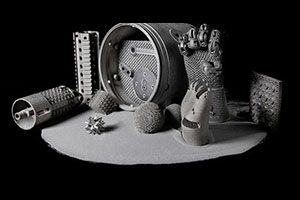
Additive manufactured components testing requires the analysis of a wide array of properties, based not only on the end-use of the part but also the AM process being used to produce them. With the push towards lighter, more durable products created with AM technology, supply chains must ensure that their products meet or exceed physical characteristic specifications of quality.
ADDITIVE MATERIALS TESTING- TAP DENSITY
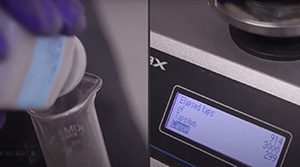 The testing of density of powders for additive materials manufacturing is done with the tap density test, which is performed by mechanically tapping the powder sample a set number of times. The resulting data measures the tapped density of the powder. Tapped density is measured as a ratio: the mass of the powder in relation to the volume of the powder after it has been tapped. The tapped density ratio measurement is useful in additive materials manufacturing because it ensures that the powders selected for a given application are suitable.
The testing of density of powders for additive materials manufacturing is done with the tap density test, which is performed by mechanically tapping the powder sample a set number of times. The resulting data measures the tapped density of the powder. Tapped density is measured as a ratio: the mass of the powder in relation to the volume of the powder after it has been tapped. The tapped density ratio measurement is useful in additive materials manufacturing because it ensures that the powders selected for a given application are suitable.
ADDITIVE MATERIALS TESTING- GAS PYCNOMETER
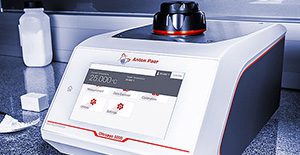 A gas pycnometer is used to measure absolute density or skeletal density of a solid. The test is non-destructive and is used on materials that are granular, porous, or irregularly shaped. The testing offers insight into material stability, quality, and purity and is done so quickly and with highly accurate results. The analysis received from a gas pycnometer test is applicable in additive materials manufacturing as an overview of material properties in relation to the applications they may be used for.
A gas pycnometer is used to measure absolute density or skeletal density of a solid. The test is non-destructive and is used on materials that are granular, porous, or irregularly shaped. The testing offers insight into material stability, quality, and purity and is done so quickly and with highly accurate results. The analysis received from a gas pycnometer test is applicable in additive materials manufacturing as an overview of material properties in relation to the applications they may be used for.
ADDITIVE MATERIALS TESTING- APPARENT DENSITY
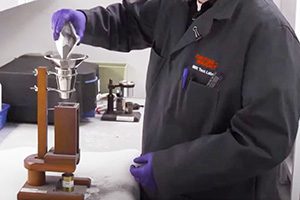 Apparent density is performed on powders and solids, and measures the density of the material less the void spaces between the particles. The use of materials in the additive materials manufacturing industry is directly impacted by the apparent density measurements of the materials.
Apparent density is performed on powders and solids, and measures the density of the material less the void spaces between the particles. The use of materials in the additive materials manufacturing industry is directly impacted by the apparent density measurements of the materials.
ADDITIVE MATERIALS TESTING - METHODS FOR MATERIAL CHARACTERIZATION
POROSITY
Created when small pockets of air get formed in the body of the part or component being printed. It can be in the form of a process-induced porosity, or a gas-induced porosity. This can lead to cracks and fatigue due to a reduction in the density of the part.
- Testing Methods: Helium Pycnometer, Metallographic Analysis
DENSITY
This measurement is in a direct inverse relationship with porosity. A reduction in density due to porosity can lead to fatigue and cracking when applying pressure. An evaluation of Particle Size Distribution is helpful, since a proportional number of small particles can fill in the gaps around the larger particles, reducing porosity and increasing density.
- Testing Methods: Archimedes, Helium Pycnometer, Microstructure Analysis
CRACKING
When melted metal solidifies, the risk of cracking increases. Careful monitoring of the energy source to keep its output level consistent and moderate during production/printing will help mitigate the potential for damage. The quality and characteristics of the alloy powder are critical in maintaining the integrity of the printed part. Delaminating can also occur when the powder is not melted to an adequate level or escapes to form a re-melting layer under the melt pool.
- Testing Methods: Ultrasonic, Metallography
FUNCTIONAL STRENGTH
In addition to providing incredible flexibility in design, additive manufactured products need to meet strength and durability standards. Mechanical testing offers a variety of methods.
- Testing Methods: Tensile, Fatigue, Fracture Toughness
RESIDUAL STRESS
During the metal 3D printing process, residual stress is created due to the inherent heating/cooling cycles and expansion/contraction. Cracking can occur when the residual stress exceeds the printing material’s tensile strength. The most vulnerable location for this issue is the common interface between the part being manufactured and the build plate.
- Testing Methods: X-Ray Diffraction (XRD), Hole Drilling
ADDITIVE MANUFACTURING PRODUCTION METHODS
SLA- Stereolithography (H3)
DLP- Digital Light Processing
FDM- Fused Deposition Modeling
SLS- Selective Laser Sintering
SLM- Selective Laser Melting
EBM- Electron Beam Melting
Wire Arc Additive Manufacturing
LOM- Laminated Object Manufacturing
BJ- Binder Jetting
MJ- Material Jetting
MATERIALS CHARACTERIZATION CHALLENGES IN ADDITIVE MANUFACTURING TESTING
The rapid growth of additive manufacturing has introduced new materials testing challenges due to the unique nature of raw materials and printed structures. Key challenges include:
Mechanical Testing and Metallography
For intricate designs and novel alloy microstructures.
Analytical Chemistry
For new alloys designed to enhance strength and minimize post-processing.
Fundamental Properties
Identify microstructure, density, strength, and fracture toughness for new materials.
Testing Expertise and Capacity
AM adoption continues to grow, trust IMR Test Labs with diverse raw materials like nickel, steel, titanium alloys, and polymers.
Quick turnaround testing is crucial for supporting continuous improvement in high-performance applications. Request a quote.
BENEFITS OF CHOOSING IMR TEST LABS FOR ADDITIVE MANUFACTURING TESTING
- Equipment - IMR Test Labs has invested in state-of-the-art equipment and technology for testing and has expanded capabilities in raw material characterization and finished product testing
- Experience - IMR Test Labs technicians are experts in analyzing materials and processes and has dedicated resources for AM customers in order to get faster turnaround on quotes
- Efficiency - IMR Test Labs is dedicated to fast turnaround on jobs, helping manufacturers make important evaluations quickly and easily
- Quality - IMR Test Labs has a strict control system in place to ensure testing is completed with the utmost integrity
- Accreditations - IMR Test Labs is a Nadcap and A2LA (ISO 17025) approved laboratory and holds accreditations from Boeing, GE, Pratt & Whitney, Rolls Royce, and many more. IMR holds 15 processing approvals from Honeywell, including Atomic Emission Spectroscopy and Microindentation Hardness Testing. View the complete list.
ADDITIVE MANUFACTURING ANALYTICAL SERVICES
CHEMICAL ANALYSIS
Apparent Density
Ash Content
Carney Flow
C, H, O, N, S
Chemical Resistance
Cleanliness Testing
Coating Weight
Contaminant/Corrodent Analysis
Density
DSC Analysis (Melting Point, Glass Transition, % Crystallinity, Degree of Cure, Purity)
Filler Content Analysis
FTIR AnalysisHall Flow
Halogen Analysis (IC)
Heavy Metal Impurities
Hexavalent Chromium
ICP-AES Analysis
ICP-MS Trace Element Analysis
Ion Chromatography (IC)
Material Certification
Mercury AnalysisParticle Size Analysis PercentCrystallinity
Phase Identification
Positive Material ID (On-site PMI available)
Powder Diffraction
Precious Metal AssayScott Flow
SEM/EDX
Sieve Analysis
Trace Element Analysis
Unknown Material ID
X-Ray Diffraction (XRD)
XRF Chemistry
METALLURGICAL ANALYSIS
Case Depth
Failure Analysis
Grain Size
Image Analysis
Inclusion Rating
Intergranular Attack
Intergranular Oxidation
Macroetch/Microetch
Metallography/Materialography
Microhardness (Knoop, Vickers, MacroVickers)
Microstructure
Orientation in Microstructure
Particle Analysis (Distribution, ID, Size)
SEM Analysis
MECHANICAL TESTING
Charpy Impact Testing (-320°F to 450°F)
Creep & Stress Rupture
Fatigue Testing (Axial, Low Cycle, High Cycle, Rotating Beam, Coating Shear)
Fracture Mechanics
Hardness (Rockwell, Brinell)
Heat Aging
Indentation Toughness
ADDITIVE MANUFACTURING VIDEO
DOWNLOAD OUR FREE EBOOK
MATERIALS TESTING FOR THE ADDITIVE MANUFACTURING INDUSTRY
While Additive Manufacturing is a huge growth industry, new technologies are making the choice for raw materials a more complex decision. Taking into account design geometries, operating environments and budget concerns, AM companies have a strong need for accurate materials characterizations to enable them to project a part's design viability and operating durability.
Find out how IMR Test Labs uses a multi-disciplinary approach to Additive Manufacturing testing and analysis. Click here (or on the button below) to download our eBook.
